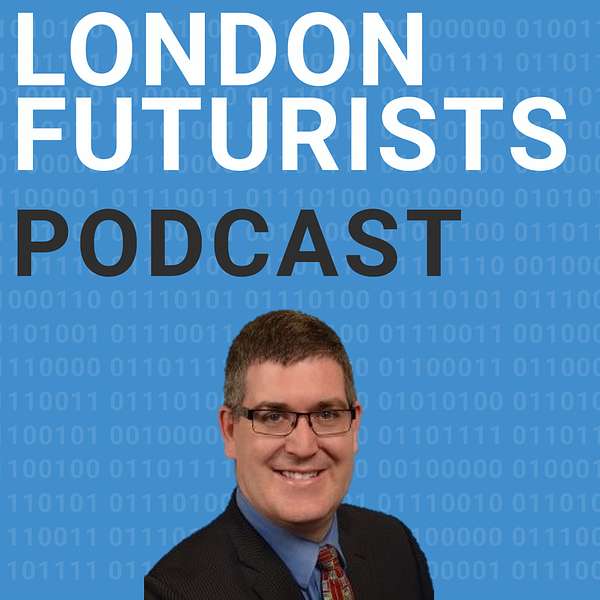
London Futurists
Anticipating and managing exponential impact - hosts David Wood and Calum Chace
Calum Chace is a sought-after keynote speaker and best-selling writer on artificial intelligence. He focuses on the medium- and long-term impact of AI on all of us, our societies and our economies. He advises companies and governments on AI policy.
His non-fiction books on AI are Surviving AI, about superintelligence, and The Economic Singularity, about the future of jobs. Both are now in their third editions.
He also wrote Pandora's Brain and Pandora’s Oracle, a pair of techno-thrillers about the first superintelligence. He is a regular contributor to magazines, newspapers, and radio.
In the last decade, Calum has given over 150 talks in 20 countries on six continents. Videos of his talks, and lots of other materials are available at https://calumchace.com/.
He is co-founder of a think tank focused on the future of jobs, called the Economic Singularity Foundation. The Foundation has published Stories from 2045, a collection of short stories written by its members.
Before becoming a full-time writer and speaker, Calum had a 30-year career in journalism and in business, as a marketer, a strategy consultant and a CEO. He studied philosophy, politics, and economics at Oxford University, which confirmed his suspicion that science fiction is actually philosophy in fancy dress.
David Wood is Chair of London Futurists, and is the author or lead editor of twelve books about the future, including The Singularity Principles, Vital Foresight, The Abolition of Aging, Smartphones and Beyond, and Sustainable Superabundance.
He is also principal of the independent futurist consultancy and publisher Delta Wisdom, executive director of the Longevity Escape Velocity (LEV) Foundation, Foresight Advisor at SingularityNET, and a board director at the IEET (Institute for Ethics and Emerging Technologies). He regularly gives keynote talks around the world on how to prepare for radical disruption. See https://deltawisdom.com/.
As a pioneer of the mobile computing and smartphone industry, he co-founded Symbian in 1998. By 2012, software written by his teams had been included as the operating system on 500 million smartphones.
From 2010 to 2013, he was Technology Planning Lead (CTO) of Accenture Mobility, where he also co-led Accenture’s Mobility Health business initiative.
Has an MA in Mathematics from Cambridge, where he also undertook doctoral research in the Philosophy of Science, and a DSc from the University of Westminster.
London Futurists
The future of space-based solar power, with John Bucknell
In the future, energy will be too cheap to meter. That used to be a common vision of the future: abundant, clean energy, if not exactly free, then much cheaper than today's energy. But a funny thing happened en route to that future of energy abundance. High energy costs are still with us in 2023, and are part of what's called the cost-of-living crisis. Moreover, although there's some adoption of green, non-polluting energy, there seems to be as much carbon-based energy used as ever.
Regular listeners to this show will know, however, that one of our themes is that forecasts of the future often go wrong, not so much in their content, but in their timing. New technology and the associated products and services can take longer than expected to mature, but once a transition does start, it can accelerate. And that's a possible scenario for the area of technology we discuss in this episode, namely, space-based solar power.
Joining us to discuss the prospects for satellites in space gathering significant amounts of energy from the sun, and then beaming it wirelessly to receivers on the ground, is John Bucknell, the CEO of the marvellously named company Virtus Solis.
John has been with Virtus Solis, as CEO and Founder, since 2018. His career previously involved leading positions at Chrysler, SpaceX, General Motors, and the 3D printing company Divergent.
Selected follow-ups:
https://virtussolis.space/
Music: Spike Protein, by Koi Discovery, available under CC0 1.0 Public Domain Declaration
Elevate how you lead with insight from today’s most influential executives.
Listen on: Apple Podcasts Spotify

